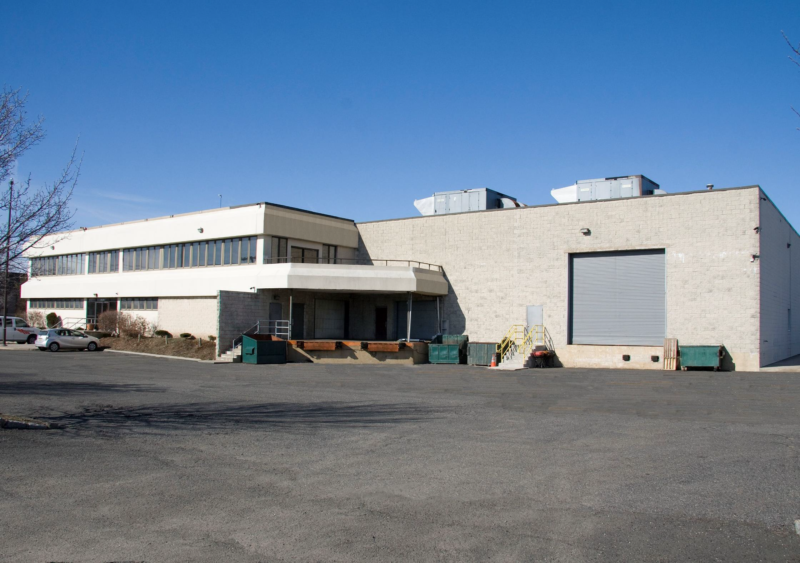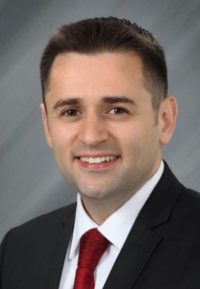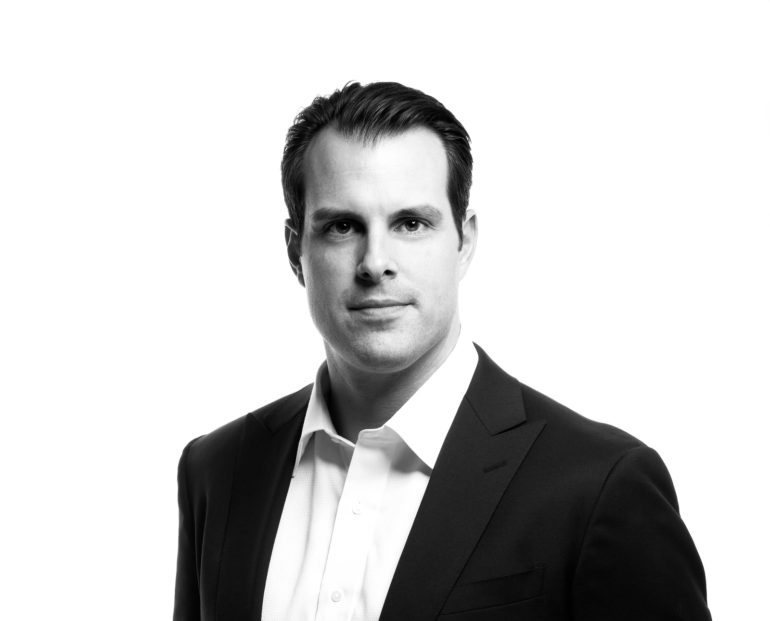Brian Hosey was named regional manager for Marcus & Millichap’s northern New Jersey office in 2014, about four years after joining the firm. — Courtesy: Marcus & Millichap
By Joshua Burd
After five years in the music business, Brian Hosey had plenty to show for it.
He had climbed the ladder working for the legendary rock ‘n’ roll talent agent Jonny Podell. He was booking tours for the likes of Peter Gabriel, the Allman Brothers, Cyndi Lauper and Gavin DeGraw, among others, and he had learned the value of investing his time as a means to achieving success.
“That’s where I really learned how to hustle and how to work hard,” Hosey said. “Because in that business, it is a 24-7, ‘always on’ type of business, and you’re always working.”
Those lessons proved to be especially useful by 2009, when he reached what he felt was a ceiling in his earning potential and realized he “needed a big change” from the talent agent business. He set his eyes on being a commercial real estate broker, noting that he wanted to be in a commission-based business “where I would get out of it what I put in.”
Hosey became licensed and found that opportunity with Marcus & Millichap, which hired him to sell apartment and mixed-use properties in Midtown Manhattan. As it turns out, the fact that real estate was reeling from the economic downturn was perhaps a blessing in disguise.
“I didn’t know it at the time, but it was probably one of the best times to get into real estate and into brokerage,” he said. “It was all upside, and as a broker you really had to hone your skills.”
Nearly a decade later, Hosey has risen through the ranks again, having established himself as a top producer and manager in Manhattan. In 2014, he was hired as the regional manager for Marcus & Millichap’s northern New Jersey office, where he now oversees a growing sales team of about 40 for the nation’s largest investment real estate brokerage firm for private clients.
The 36-year-old Hosey, who says he is a product of the firm’s industry-leading, 12-step training program, has hired about 10 new brokers since taking the helm. And as he looks to continue that growth, he is in the market both for experienced agents and for hungry, talented salespeople from inside and outside the industry who could reap the same benefits of mentorship.
Nationally, Marcus & Millichap closed some 9,000 transactions in 2016 for a total $42.3 billion in sales volume, up nearly 12 percent from 2015. The firm did 110 transactions in northern and central New Jersey last year, most of them in the $1 million to $10 million range that has been a hallmark of the firm, and Hosey feels now is the time to expand.

He points first and foremost to the “capital migration” from New York City. And he added that, increasingly, “people are starting to see that there’s some real benefit of putting money into investment real estate.”
“So when I think about our opportunity, we’re the No. 1 firm in the No. 1 metro, in an industry where only 5 percent of people own what we sell,” Hosey said. “And it’s growing. I think we’re poised for just exponential growth.”
To talk about it all, Hosey sat down recently with Real Estate NJ. Below are excerpts from the interview.
Real Estate NJ: It was definitely an interesting time to get into commercial real estate in 2009. What were those early days like?
Brian Hosey: It was a scary time and a lot of people don’t realize it. I remember sitting in sales meetings and there was nothing to talk about. There were no new listings, there were no sales and some agents just took a year off. … It was scary all around.
But what I love about this business is that you can basically start up your own practice underneath the umbrella of a firm and there’s very little startup costs. You don’t have to rent space, you don’t have to buy inventory, you don’t have to hire employees. It’s basically time — you’re investing your time, and if you can survive during that ramp-up period, there’s no reason you won’t make money if you’re following the program.
RENJ: And when do you feel like you actually hit your stride?
BH: I made no money for the first nine months. I made a very small check by my 12th month. In my second year, I started hitting my stride, and in the third year was when it really all started to connect, because you kind of hit that intersection of having relationships and having the skill to do the business. Plus, the market had come back by then.
RENJ: So you became a sales manager in Manhattan in 2013 and that’s when you really dove into the training and hiring side. When you came across the opportunity in New Jersey, what appealed to you about making the move?
BH: I just jumped on the opportunity because I could see that northern New Jersey was about to undergo just a massive wave of investment, just like Brooklyn and Queens saw around 2010 through the current time.
It’s a major opportunity for us and for the agents that I’ve hired. You look at what we call capital migration: Last year, over 30 percent of our buyers came from New York City. That’s double what it was five years prior. So the data shows that money is starting to flow into New Jersey at a pretty exponential rate, and I think we’re at the front edge of a wave of activity.
RENJ: You seem bullish on just about every asset class here, including suburban office. Why is that?
BH: We’re going to see a resurgence in demand for suburban office space in New Jersey for two reasons: The yields for other investments have gotten so low because price has gone up. If you buy an apartment building in Hoboken now, you’re looking at probably a 5 percent (return) or even less. For the same amount of money, you can buy an office building and get an 8 to 10 percent return.
Number two is that I think you will see companies that are currently in Manhattan start to look outward just like the renter base is, because office rents in Manhattan are skyrocketing. And if you think about most of the executives that are running those operations or running those offices, where do they live? In the suburbs — of Long Island, Westchester, Connecticut or New Jersey. So you can make the compelling case that over the next 10 to 20 years, some of those operations might move out. And they’ve already started.
RENJ: And you’re clearly bullish about the other sectors.
BH: Multifamily, yes. That’s already happening right now. Retail strip centers, yes. It’s happening now — if they’re well-located — because the big-box retailers are getting crushed. … But if you have a neighborhood strip center that has local service providers like a Chinese restaurant, a dry cleaner, a deli and grocery store, I think you’re fine. So we’re seeing a lot of interest there.
For industrial and warehousing, there’s off-the-charts demand, especially along the major corridors. And suburban office has lagged, but we’re starting to see a little bit of an uptick in interest there now.
RENJ: So you’ve moved the North Jersey office from Elmwood Park to Saddle Brook and now have this very clean, very modern space for your team. You’ve grown the sales force by about 25 percent since taking over. What’s your plan going forward?
BH: We’ve added some talented college graduates. We’ve also added some experienced agents — we hired Fahri Ozturk from Cushman & Wakefield. He came on board in October of last year and we’re growing a team around him. We’ve hired several juniors for him already.

So I have sort of a multipronged approach to growing the office. I’m looking for talented young people that want to get into the business, I’m looking for experienced agents that bring a book of business and I’m also looking for experienced salespeople, maybe outside of real estate, who know how to sell, who want to make a transition just like I did.
RENJ: Do you have any other specific goals, short-term or long-term?
BH: We’re looking to hire another half-dozen to dozen agents in the next 12 to 24 months — talented people. And we’re making more of a push into office and industrial sales. We’re also pushing into more expensive properties, so we’re elevating our airspace and getting more into institutional-sized deals — let’s say, $20 million-plus, which is really exciting.
RENJ: Is that a company-wide push or just in New Jersey?
BH: It’s both. As a firm, our history is really steeped in the private client business, the $1 million to $10 million business. That’s where 80 percent of all commercial transactions occur. However, real estate in this area is just more expensive. What we’re seeing now is that private client owners have accumulated so much wealth over the years that now they’re elevating and buying more expensive properties. There’s sort of a convergence between institutional and private clients. It’s getting gray. The institutional airspace has looked down the value chain and started playing in the $5 million to $10 million zone to get the yields, and it works perfectly for us because we were always a private client firm. And now we’re a private client firm expanding into the institutional airspace, versus some of our competitors that are institutional and they’re trying to expand into the private client airspace. Expansion down is actually much harder because it’s such an inefficient marketplace and the client pool is scattered all over the marketplace.
Career adjustments
When Brian Hosey became a real estate broker, it wasn’t the first time he had to change course in his career.
Growing up on Long Island, he picked up drumsticks as a middle school student and would go on to join a band that played at parties, bar mitzvahs, weddings and other venues. And he had his eyes on the music business when he enrolled at Syracuse University as a dual major in business and communications, going on to intern at labels such as Sony and EMG.
But his plans to continue down that path were derailed by the advent of Napster, the disruptive file-sharing service.
“By 2003, the entire music business was destroyed on the label side, so everyone was scrambling for Plan B,” Hosey recalled. “Plan B for me was getting into the live side and I got a job as a junior agent at a talent agency.”
Spending the next five years in that field has ultimately helped him as a talent evaluator, he said, even when he made the move to commercial real estate and became a manager. And as someone who has successfully changed careers, Hosey isn’t afraid to look outside the real estate industry for new recruits.
The firm’s new hires in New Jersey have included a former Wall Street broker and entrepreneurs, including an agent who ran a boat chartering business in Hoboken with her husband.
“That’s about as entrepreneurial as you can get. It’s everything — it’s sales, it’s marketing, it’s all in one,” Hosey said. “And it didn’t work out, which is fine, but now she wanted to take that experience and roll it into commercial real estate.”
For those agents who do succeed, he said Marcus & Millichap’s training program plays a major role in separating the firm from its competitors.
The program includes a 12-step continuum, which takes a young broker through everything from researching and building a database to closing, along with mentorship by senior agents.
“This goes for really any sales business, because without that database, it becomes random acts of brokerage, random acts of sales,” he said. “So you want to identify your farm area — who are the 2,000 people that I want to target in my business? And you systematically build relationships with those people.”
It’s a far cry from “just getting thrown into the deep end, and you either figure it out or you don’t,” an approach that Hosey said causes brokers to “develop some really bad habits.”
“We’re changing the success ratio from the inside out. If you look at the success ratios in our industry, they’re pretty poor,” he said. “Most young people don’t make it in real estate, and we’re way ahead of that.”










